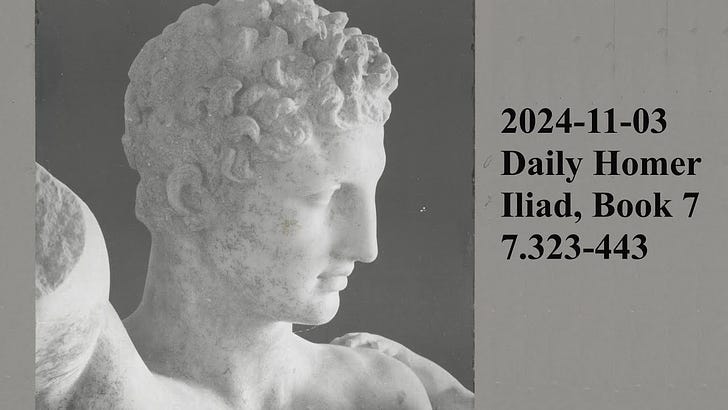“Hello, and welcome to Homer for November 3, 2024.
αὐτὰρ ἐπεὶ πόσιος καὶ ἐδητύος ἐξ ἔρον ἕντο,
τοῖς ὁ γέρων πάμπρωτος ὑφαίνειν ἤρχετο μῆτιν
325Νέστωρ, οὗ καὶ πρόσθεν ἀρίστη φαίνετο βουλή:
ὅ σφιν ἐϋφρονέων ἀγορήσατο καὶ μετέειπεν:
‘Ἀτρεΐδη τε καὶ ἄλλοι ἀριστῆες Παναχαιῶν,
πολλοὶ γὰρ τεθνᾶσι κάρη κομόωντες Ἀχαιοί,
τῶν νῦν αἷμα κελαινὸν ἐΰρροον ἀμφὶ Σκάμανδρον
330ἐσκέδασ᾽ ὀξὺς Ἄρης, ψυχαὶ δ᾽ Ἄϊδος δὲ κατῆλθον:
τώ σε χρὴ πόλεμον μὲν ἅμ᾽ ἠοῖ παῦσαι Ἀχαιῶν,
αὐτοὶ δ᾽ ἀγρόμενοι κυκλήσομεν ἐνθάδε νεκροὺς
βουσὶ καὶ ἡμιόνοισιν: ἀτὰρ κατακήομεν αὐτοὺς
τυτθὸν ἀπὸ πρὸ νεῶν, ὥς κ᾽ ὀστέα παισὶν ἕκαστος
335οἴκαδ᾽ ἄγῃ ὅτ᾽ ἂν αὖτε νεώμεθα πατρίδα γαῖαν.
τύμβον δ᾽ ἀμφὶ πυρὴν ἕνα χεύομεν ἐξαγαγόντες
ἄκριτον ἐκ πεδίου: ποτὶ δ᾽ αὐτὸν δείμομεν ὦκα
πύργους ὑψηλοὺς εἶλαρ νηῶν τε καὶ αὐτῶν.
ἐν δ᾽ αὐτοῖσι πύλας ποιήσομεν εὖ ἀραρυίας,
340ὄφρα δι᾽ αὐτάων ἱππηλασίη ὁδὸς εἴη:
ἔκτοσθεν δὲ βαθεῖαν ὀρύξομεν ἐγγύθι τάφρον,
ἥ χ᾽ ἵππον καὶ λαὸν ἐρυκάκοι ἀμφὶς ἐοῦσα,
μή ποτ᾽ ἐπιβρίσῃ πόλεμος Τρώων ἀγερώχων.
Today, we’re diving into a fascinating scene where, after feasting, Nestor addresses the Achaean leaders. Once their desire for food and drink is satisfied, the wise elder Nestor, known for his thoughtful counsel, speaks to Agamemnon and the assembled Achaean warriors. He begins with a reflection on the many lives lost—the "long-haired Achaeans" who have fallen by the Scamander River, their spirits descending to Hades. To honor the fallen, Nestor suggests they pause the fighting at dawn to retrieve and properly bury their comrades.
He outlines a ritual for gathering the bodies using bulls and donkeys, followed by a ceremonial burning near the ships, allowing for the eventual return of each warrior's bones to his homeland. Furthermore, Nestor proposes building a tomb and fortifying their encampment, constructing high walls with strong gates for chariot access. To strengthen their defenses, he suggests digging a deep trench around the camp, which would serve as a barrier against the Trojans and their forces.
This passage reveals more than just battle strategy. Nestor's speech underscores the Achaeans’ deep respect for the dead, showing that even in wartime, honoring those who have passed remains essential. It’s a ritualistic pause, highlighting that some things—like proper burial—transcend the urgency of war. Nestor also cleverly introduces the idea of fortifying their position, a significant decision that foreshadows themes of hubris and the impact of reshaping the land in The Iliad.
The passage reminds us of ancient reverence for the dead, as seen in other texts like the Old Testament, where caring for the deceased is considered both sacred and practical. The suggestion of building a wall also hints at a shift in the Achaeans' strategy, blending reverence with tactical forethought.
Thank you for listening, and I hope you have a great day! Take care.”



